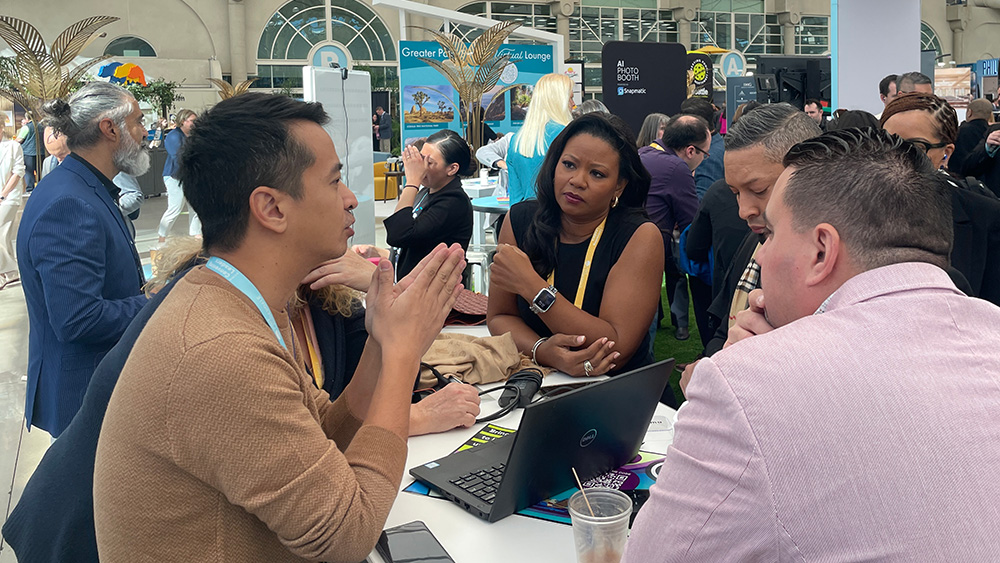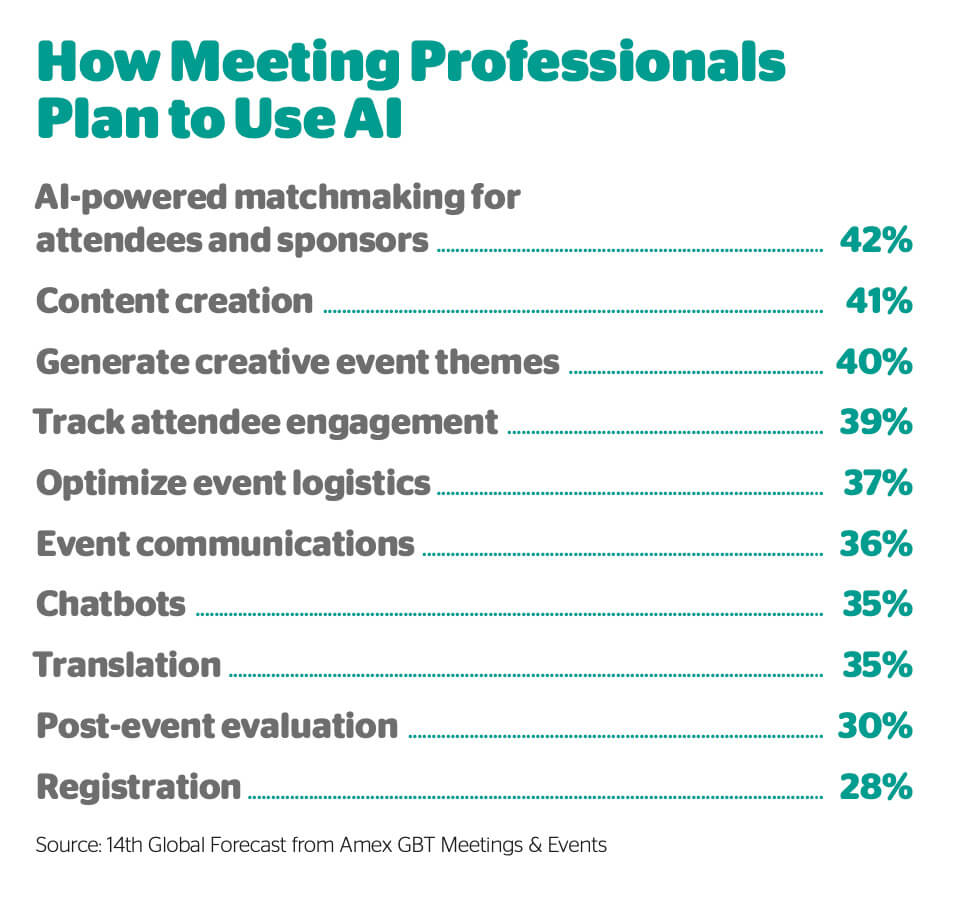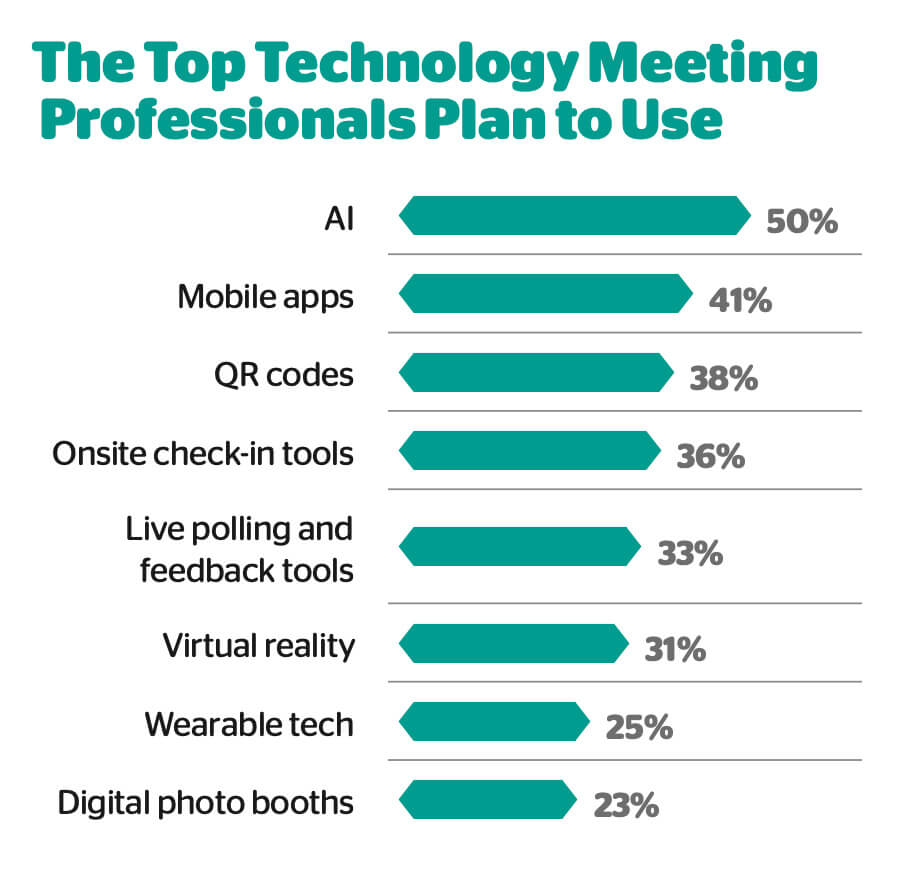
Illustration by Julie Murphy
Annual Events Industry Forecast
Our usual approach to Convene‘s Annual Industry Forecast is to cast a wide net, gathering a variety of data related to the business events industry, including travel, lodging, technology, and the workplace. This year, we took a different tack. Instead of those wide-ranging forecasts, Convene editors wrote succinct trends reports for each sector. We’ve sifted through the research to come up with a few signposts to help you navigate the year ahead, whatever course it takes. And, as always, the Forecast includes our Annual Meetings Market Survey, which gives us a strong sense of where we stand at this moment in time — the ups, the downs, the challenges, and our overall mood.

Humans faced off against AI in an event-planning competition at PCMA Convening Leaders 2024 in San Diego.
In November 2022, OpenAI released the first iteration of ChatGPT to the public, opening the floodgates of AI-generated content and the use of natural language processing to analyze large amounts of data. As fears that generative AI would make them obsolete have subsided, many planners began experimenting with — and embracing — the myriad ways that AI can help them do their jobs better.
Two years in, there’s another conversation on the rise: What humans can do that AI can’t. “AI can’t build connections or facilitate amazing experiences,” Mathew Sweezey, chief strategy officer at Smart Token Labs and former Salesforce marketing executive, told Marketing Companion podcast host and futurist Mark Schaefer. “AI can’t build a deeper level of trust,” Sweezey said on the podcast. “It has to be human — AI can’t take that on.”
AI, however, can assist. Using AI to make connections between meeting participants and event sponsors is the top way that meeting professionals say they plan to use AI, according to the 14th Global Forecast from Amex GBT Meetings & Events. In an increasingly AI-driven world, the report noted, “we’re also seeing a strong desire for human connection, with rising demand for face-to-face experiences.”
RELATED: Will Event Tech Costs Fuel Low-Tech Options?
What is also on the rise is the understanding that it is meeting professionals’ own judgment and creativity that drive the best AI-assisted outcomes. A 2022 study found that human confidence was one of the best predictors of good outcomes in decisions made with the help of AI — too little self-confidence can result in an over-reliance on AI. After experimenting with using AI to help her write drafts of promotional emails for a client, Valerie Sumner, co-owner of VRS Meetings & Events, told Convene she realized that what AI-generated content was missing was her own voice.
More than half — 57 percent — of the content on the internet today is either AI-generated or translated using an AI algorithm, according to research released last summer by Amazon Web Services AI Labs. As AI-generated content continues to accelerate, the uniquely human stamp that meeting professionals place on their work will increasingly be valued. “Taste is becoming more and more important in this age of so much being algorithmic, with so much being served up to you by AI,” said Ezra Klein, host of The New York TimesEzra Klein Show podcast. Klein was talking about editing, a set of skills that is analogous to event organizers’ expertise in curating and creating content. “Knowing what you like, what you think is good, what you think is bad, what you respond to — that really matters,” Klein said. “That is a way to maintain both humanity and the capacity to do great things.”
LinkedIn’s AI Echo Chamber
Relying too heavily on AI tools to create LinkedIn posts can backfire, warns “LinkedIn Algorithms Insights 2024.” The same “hooks” used to begin posts appear 16 times more frequently in AI-generated posts and the same calls to action used to end posts appeared 11 times more often — resulting, the report said, in a 55 percent drop in engagement and a 60 percent lower clickthrough rate “compared to original content (!)”
Barbara Palmer is deputy editor at Convene.


